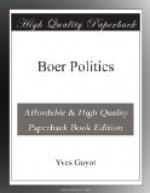English resident in Pretoria was anomalous,”
he assented to the Convention of 27th February,
1884, “by which,” say the Boer delegates,
“the suzerainty over the Transvaal was abolished,
and the South African Republic’s complete
independence acknowledged.” This is
their contention, now for the facts.”
I then adverted to the events of which the XVth. and XVIth. chapters of La Politique Boer give a summary. The Jameson raid is, of course, the mainstay of the delegates’ argument. After showing what this is really worth, and also discussing the arbitration question, I concluded as follows:
“The Memorandum shirks all the questions; documents are not referred to; there is nothing in it but assertions, which are to be accepted without discussion. It ends by mixing up what relates to the organisation and adminstration of the two Republics. But the adminstration of the Orange Free State and the adminstration of the South African Republic were quite different things. By following Krueger’s policy Mr. Steyn has been guilty of a crime as well as a great political blunder. Had he remained neutral the English army would have been compelled to establish the basis of its operations much farther North, and would have been deprived of the use of the railway line to Bloemfontein. Moreover, when peace was restored, he would have remained independent. The Memorandum alludes to the prosperity of the Transvaal, but forgets to mention that the only share taken in it by the Boers has been an ever-increasing appropriation of the wealth created by the Uitlanders’ industry, capital and labour.
“The Memorandum mentions also the laws passed annually, but is careful to omit law No. 1 of 1897, by which Mr. Krueger was empowered to exact from the judges a declaration that decisions of the Volksraad would be enforced by them as legal enactments, whether they were in agreement with the constitutions or not, and to dismiss at a moment’s notice any one of them whose response might seem to him unsatisfactory.
“We have already spoken of the concluding sentences in the Memorandum. Messrs. A. Fischer, C.H. Wessels, A.D.W. Wolmarans “appeal to the Conference de l’Union Interparlementaire to take in hand their cause.” The Executive Committee has, as has already been said, ruled the question out of order. This decision is not to be regretted considering the tendencies of the delegates’ Memorandum; it does not help their cause any more than does Dr. Kuyper’s article.”
M. Pauliat complained bitterly of the decision. A progressive member of the Belgian deputation, Mr. Lorand, tried to revive the question on the 2nd of August by means of the following resolution:




